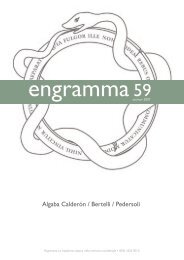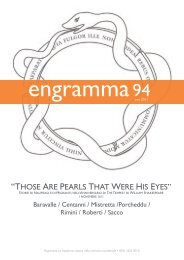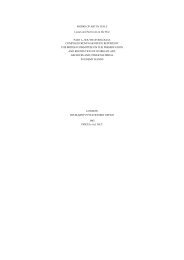Daniela Sacco, Pensiero in azione. Bertolt Brecht ... - Engramma
Daniela Sacco, Pensiero in azione. Bertolt Brecht ... - Engramma
Daniela Sacco, Pensiero in azione. Bertolt Brecht ... - Engramma
Create successful ePaper yourself
Turn your PDF publications into a flip-book with our unique Google optimized e-Paper software.
<strong>Daniela</strong> <strong>Sacco</strong><br />
Qe 03• <strong>Pensiero</strong> <strong>in</strong> <strong>azione</strong><br />
meccanismo che plasma il metodo artistico di <strong>Brecht</strong> – può essere riletto qu<strong>in</strong>di alla luce di un<br />
pensare per immag<strong>in</strong>i. E si rivela così un meccanismo mitopoietico per eccellenza.<br />
English abstract<br />
The Kriegsfibel (War primer) is <strong>Bertolt</strong> <strong>Brecht</strong>’s reference work to recognize the montage as a device<br />
for composition that structurally mirrors the transformation of the world view of the twentieth century,<br />
characterized by a way of th<strong>in</strong>k<strong>in</strong>g that can be def<strong>in</strong>ed ‘<strong>in</strong> images’, which is regulated by a dramaturgic<br />
pr<strong>in</strong>ciple; a way of th<strong>in</strong>k<strong>in</strong>g, dist<strong>in</strong>ct from the modern rationalist way, which recovers the gnoseological<br />
value of images and a new evaluation of space, as a consequence of the crisis of metaphysical th<strong>in</strong>k<strong>in</strong>g.<br />
It is a significant work for several reasons. First, the historical moment <strong>in</strong> which it is realized: the<br />
experience of the exile dur<strong>in</strong>g the Second World War; second, because of its characteristic form: a<br />
montage of texts and images; third, for the reason that, though not a theatrical work, it is however<br />
reveal<strong>in</strong>g of the theatrical method of its author. This work is also <strong>in</strong>terest<strong>in</strong>g <strong>in</strong> relation to the change of<br />
<strong>Brecht</strong>’s consideration of classics and myth after the experience of war. The decision to stage a Greek<br />
tragedy – the Antigone des Sophokles – on his return from the exile, and the reflections about the<br />
dialectic nature of theater, are reveal<strong>in</strong>g of this shift and allow to th<strong>in</strong>k back on the mean<strong>in</strong>g of ‘epic’,<br />
term used by <strong>Brecht</strong> to def<strong>in</strong>e his theater. The epic theater can be brought back to an horizon of mythical<br />
and tragic – rather than historical – thought, made of a dialectic and dramaturgic mechanism that, as<br />
Ejzenštejn noticed <strong>in</strong> his reflections about montage, implies not the succession but the conflict and the<br />
juxtapositions of parts (texts, images as fragments).<br />
18











